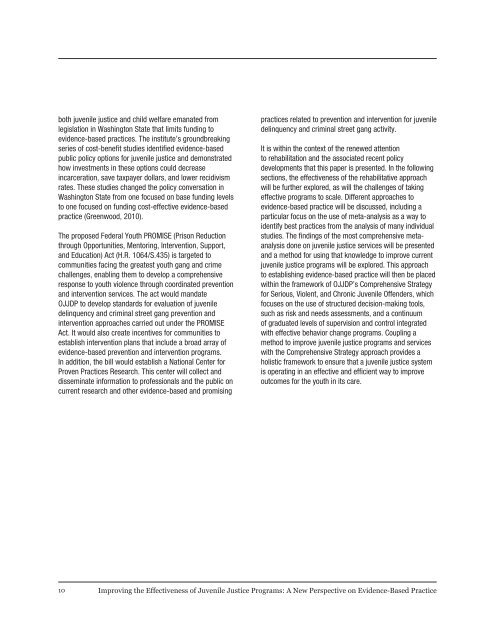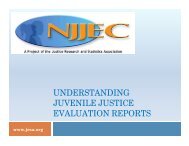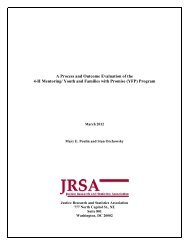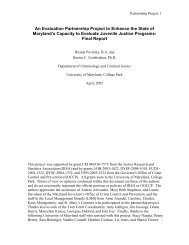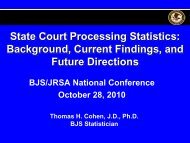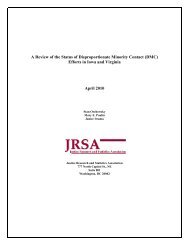Improving the Effectiveness of Juvenile Justice Programs: A New
Improving the Effectiveness of Juvenile Justice Programs: A New
Improving the Effectiveness of Juvenile Justice Programs: A New
Create successful ePaper yourself
Turn your PDF publications into a flip-book with our unique Google optimized e-Paper software.
oth juvenile justice and child welfare emanated from<br />
legislation in Washington State that limits funding to<br />
evidence-based practices. The institute’s groundbreaking<br />
series <strong>of</strong> cost-benefit studies identified evidence-based<br />
public policy options for juvenile justice and demonstrated<br />
how investments in <strong>the</strong>se options could decrease<br />
incarceration, save taxpayer dollars, and lower recidivism<br />
rates. These studies changed <strong>the</strong> policy conversation in<br />
Washington State from one focused on base funding levels<br />
to one focused on funding cost-effective evidence-based<br />
practice (Greenwood, 2010).<br />
The proposed Federal Youth PROMISE (Prison Reduction<br />
through Opportunities, Mentoring, Intervention, Support,<br />
and Education) Act (H.R. 1064/S.435) is targeted to<br />
communities facing <strong>the</strong> greatest youth gang and crime<br />
challenges, enabling <strong>the</strong>m to develop a comprehensive<br />
response to youth violence through coordinated prevention<br />
and intervention services. The act would mandate<br />
OJJDP to develop standards for evaluation <strong>of</strong> juvenile<br />
delinquency and criminal street gang prevention and<br />
intervention approaches carried out under <strong>the</strong> PROMISE<br />
Act. It would also create incentives for communities to<br />
establish intervention plans that include a broad array <strong>of</strong><br />
evidence-based prevention and intervention programs.<br />
In addition, <strong>the</strong> bill would establish a National Center for<br />
Proven Practices Research. This center will collect and<br />
disseminate information to pr<strong>of</strong>essionals and <strong>the</strong> public on<br />
current research and o<strong>the</strong>r evidence-based and promising<br />
practices related to prevention and intervention for juvenile<br />
delinquency and criminal street gang activity.<br />
It is within <strong>the</strong> context <strong>of</strong> <strong>the</strong> renewed attention<br />
to rehabilitation and <strong>the</strong> associated recent policy<br />
developments that this paper is presented. In <strong>the</strong> following<br />
sections, <strong>the</strong> effectiveness <strong>of</strong> <strong>the</strong> rehabilitative approach<br />
will be fur<strong>the</strong>r explored, as will <strong>the</strong> challenges <strong>of</strong> taking<br />
effective programs to scale. Different approaches to<br />
evidence-based practice will be discussed, including a<br />
particular focus on <strong>the</strong> use <strong>of</strong> meta-analysis as a way to<br />
identify best practices from <strong>the</strong> analysis <strong>of</strong> many individual<br />
studies. The findings <strong>of</strong> <strong>the</strong> most comprehensive metaanalysis<br />
done on juvenile justice services will be presented<br />
and a method for using that knowledge to improve current<br />
juvenile justice programs will be explored. This approach<br />
to establishing evidence-based practice will <strong>the</strong>n be placed<br />
within <strong>the</strong> framework <strong>of</strong> OJJDP’s Comprehensive Strategy<br />
for Serious, Violent, and Chronic <strong>Juvenile</strong> Offenders, which<br />
focuses on <strong>the</strong> use <strong>of</strong> structured decision-making tools,<br />
such as risk and needs assessments, and a continuum<br />
<strong>of</strong> graduated levels <strong>of</strong> supervision and control integrated<br />
with effective behavior change programs. Coupling a<br />
method to improve juvenile justice programs and services<br />
with <strong>the</strong> Comprehensive Strategy approach provides a<br />
holistic framework to ensure that a juvenile justice system<br />
is operating in an effective and efficient way to improve<br />
outcomes for <strong>the</strong> youth in its care.<br />
10 <strong>Improving</strong> <strong>the</strong> <strong>Effectiveness</strong> <strong>of</strong> <strong>Juvenile</strong> <strong>Justice</strong> <strong>Programs</strong>: A <strong>New</strong> Perspective on Evidence-Based Practice


